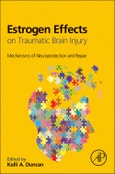This book demystifies, deconstructs, and simultaneously humanizes the field of estrogen-mediated neuroprotection following TBI, making the subject approachable to both researchers and advanced students. Bringing together leading researchers and practitioners to explain the basis for their work, methods, and their results, chapters explore what is known about the role of estrogens following damage to the brain. With topics covering induction of estrogen response, consequences of estrogen action, and mechanisms underlying estrogen mediated neuroprotection, Estrogen Effects on Traumatic Brain Injury is of great importance to teachers, researchers, and clinicians interested in the role that estrogens play following traumatic brain injury.
Please Note: This is an On Demand product, delivery may take up to 11 working days after payment has been received.
Table of Contents
1. Historical Antecedents2. Estrogen Actions in the Brain
3. Induction of Estrogen Response Following Injury
4. Astrocytic Aromatization and Injury
5. Aromatase and Estrogens: Involvement in Constitutive and Regenerative Neurogenesis in Adult Zebrafish
6. Neuroprotection by Exogenous Estrogenic Compounds Following Traumatic Brain Injury
7. Neuroprotective Effects of Estrogen Following Neural Injury
8. Neuroprotection with Estradiol in Experimental Perinatal Asphyxia: A New Approach
9. Cerebrovascular Stroke: Sex Differences and the Impact of Estrogens
10. Concluding Statements and Current Challenges








